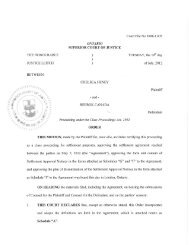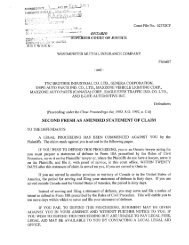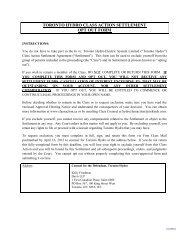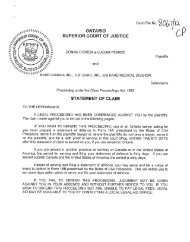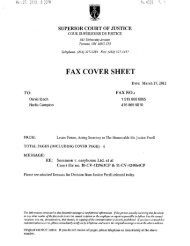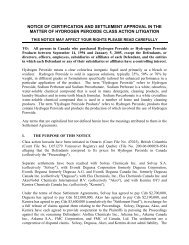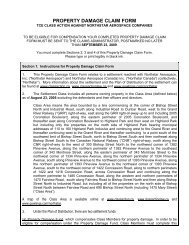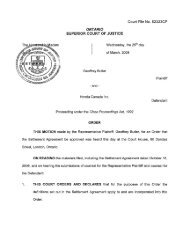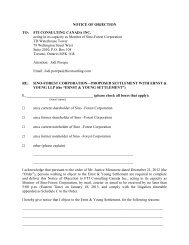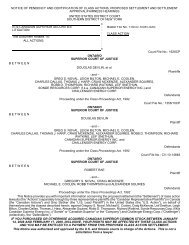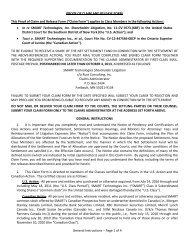Gariepy v. Shell Oil Co. - Classaction.ca
Gariepy v. Shell Oil Co. - Classaction.ca
Gariepy v. Shell Oil Co. - Classaction.ca
You also want an ePaper? Increase the reach of your titles
YUMPU automatically turns print PDFs into web optimized ePapers that Google loves.
the common issues trial versus the overall number of issues to be tried? Should it be determinedthrough a comparison of the amount of court time it would take to resolve the common issuescompared to the amount of court time that would be required to determine the individual issues? Oris there some other comparative analysis that should determine the issue? 60 As the Chief Justice said in the quotation above, the commonality question should beapproached purposively. Having considered the various possibilities, I have concluded that there isno formulaic approach that <strong>ca</strong>n be taken to the determination of this requirement. In the end result,the court must balance the pros and cons of the competing positions and reach the best answer thatit <strong>ca</strong>n given the facts and circumstances of each particular <strong>ca</strong>se. In doing so, both of the comparisonsI have mentioned may ultimately form part of the overall analysis of the issue but neither is likelyto be completely determinative of it. 61 The fundamental problem with the plaintiffs' position on the common issues is that thedetermination of whether the defendants' products are defective does not, in my view, materially orsignifi<strong>ca</strong>ntly advance the overall determination of the ultimate liability issue. It does not do sobe<strong>ca</strong>use of the fact that there are a myriad of reasons why any given class member's plumbingsystem might fail. This fact is made clear by the plaintiffs' own experts and is exemplified in thefollowing exchange from the cross-examination of Dr. Stivala. Under cross-examination, he said:"87. Q. Now, we spoke a moment ago about some of the factors which affect theprocess. I just want run through some of these and make sure I have got themstraight. I take it, first of all, that the existence of chlorine in the water is afactor which will affect the speed of the process?A. That is correct. Well, it is speed in terms of the fact that it is a strong oxidizingagent, yes, that is correct.88. Q. Right. But I think you have said elsewhere that even if it was no chlorine,the existence of oxygen-molecules in the water by themselves would <strong>ca</strong>useoxidation?A. That is correct.89. Q. If there was no chlorine and you only had the oxygen in the water<strong>ca</strong>using it, would your 50-year mandatory failure period still hold? In otherwords, would you say the oxygen in the water by itself would inevitably<strong>ca</strong>use these systems to fail within 50 years?



